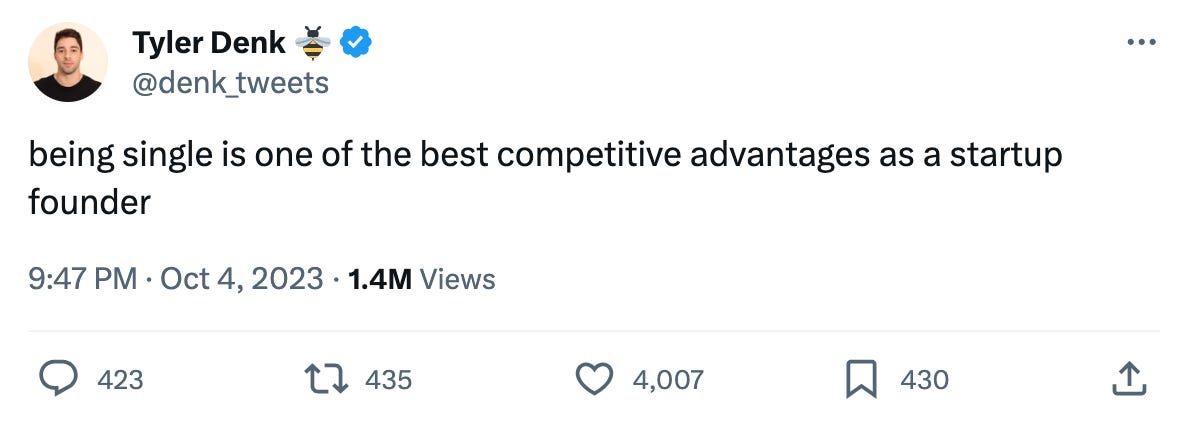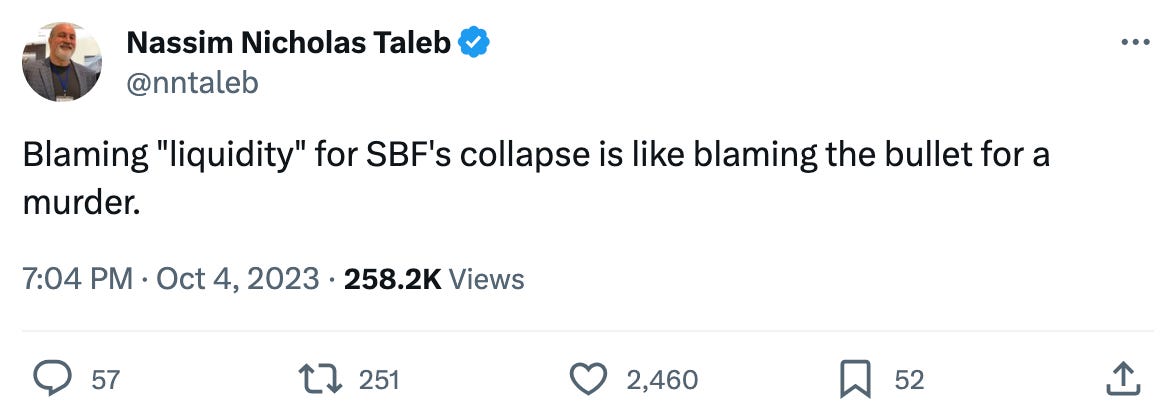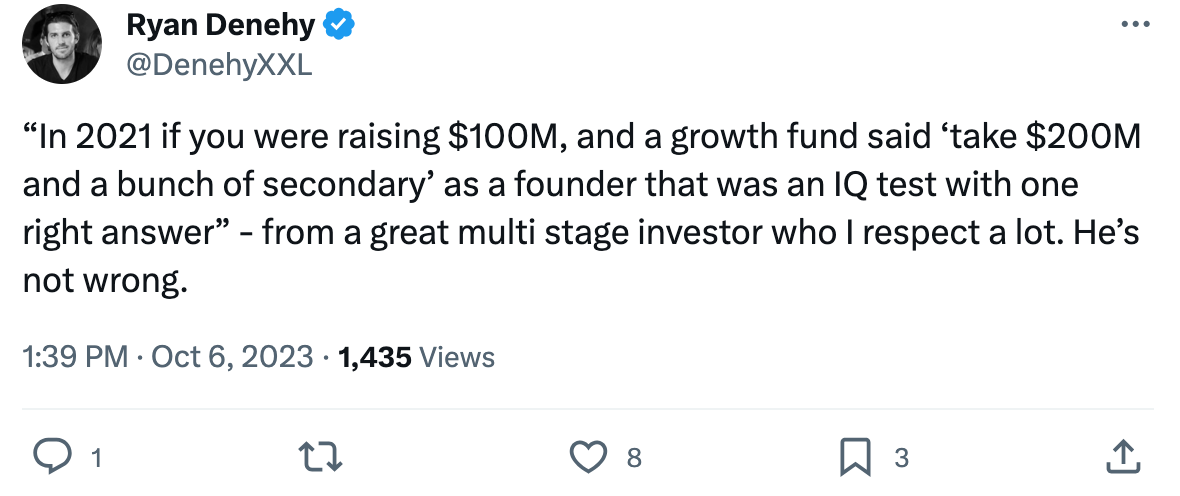Moneyball is a fortnightly newsletter from Koble exploring the limitations of human decision-making and their implications for startup investing.
We’ve spent two years developing our groundbreaking algorithms, which discover early-stage startups that outperform the market and predict their probability of success.
This week
🧠 Mental Model #25 – Winner’s & Loser’s Games – Why Venture Capital is a Loser’s Game
📖 Investor reading – The global VC market continues to stumble – The alpha of ugliness – Down rounds are rising, history shows things could get much worse
💬 Some tweets – Being single is one of the best competitive advantages as a startup founder – Blaming “liquidity” for SBF's collapse is like blaming the bullet for a murder – An IQ test with one right answer
Why Venture Capital is a Loser’s Game
In life, it helps to know what kind of game you’re playing. This is true of work, relationships, health, and yes, investing.
There are Winner’s Games and Loser’s Games. Venture Capital is a Loser’s Game. Acknowledging this somewhat unsettling fact can help us play the startup investment game better.
In his book Extraordinary Tennis for the Ordinary Tennis Player, the scientist and statistician Dr. Simon Ramo helps us to understand what we are up against. He observes that in professional tennis, c. 80% of points are won due to great shot execution, but in amateur tennis, c. 80% of points are lost due to unforced errors. Ramo concludes that professional tennis players are playing a “Winner’s Game”, whilst amateur players play a “Loser’s Game”.
To win at amateur tennis, we should seek to avoid mistakes by playing conservatively and enabling the opponent to defeat themselves by taking undue risks. But professional tennis is a whole different ball game. Most people don’t know which game they are playing, leading to poor performance:
Winner’s Games are entirely dependent on the player’s ability – think chess, running, weightlifting, DIY, cooking.
Loser’s Games are ones in which the players compete against the game itself – think amateur tennis, roulette, politics, warfare, and yes, investing.
In Loser’s Games we outperform not by making smart decisions, but by avoiding stupid mistakes. This pretty much sums up institutional investing.
The vast majority of professional money managers do not beat the market, and cannot justify the fees they charge investors. 98% of US equity funds fail to outperform over 10 years. Institutional investors think they’re playing the Winner’s Game, when they should be playing the Loser’s Game.
Investing wasn’t always like this. There was a time when a small number of imaginative and bold investors with informational advantages exploited arbitrage opportunities within and across asset classes. This happened in waves, through the birth of value investing (Benjamin Graham), early venture investing (Georges Doriot), systematic public market strategies (Jim Simons), even crypto trading.
Today, investing is a Loser’s Game in which a large number of institutional (and institutionalised) investors with no discernible competitive advantage pile into (and out of) crowded markets. The obsession with AUM as the defining metric of success tells us all we need to know about the current state of investment management.
What’s the read-across to venture capital? Most VCs don’t know which game they are playing.
It might seem like US investors are playing a different game to UK/European investors – this research paper points out that US funds are larger, more specialised, more risk tolerant and less governed by consensus, more founder-friendly, more collaborative with other investors, and more patient when it comes to waiting for exits – but ultimately even the world’s greatest VCs are playing the Loser’s Game.
Implications for investors
When it comes to startup investing, most VCs are trying to play a Winner’s Game when they should be playing a Loser’s Game. They are too focused on “doing good things” rather than “avoiding doing bad things”.
In the Startup Winter, enlightened VC are faced with a choice – play the Loser’s Game as best they can, or reinvent the game completely.
At Koble we’re re-engineering the way that startup investing works from the inside out. Massive computing power and groundbreaking data science enable us to identify early-stage investments that outperform the market, capturing sustainable alpha for investors.
“Quant VC” enables us to play a Winner’s Game. We can generate alpha from “doing good things” (applying AI to startup investing). Of course, we can also avoid doing stupid things (by technologising the investment process to make it more efficient and founder-friendly).
VC doesn’t have to be a disempowering slog towards mediocre returns. It can be something skillful and empowering. The Winner’s Game (for a select few) is back. The question is, who is bold enough to play it?
Work with Koble
At Koble, we’ve spent two years developing our groundbreaking algorithms, which discover early-stage startups that outperform the market and predict their probability of success.
We’re working with forward-thinking angels, VCs, family offices, and hedge funds to re-engineer startup investing with AI. If that resonates, get in touch.
Investor reading
📉 The global VC market continues to stumble – There was hope that the halo effect of several long-awaited tech IPOs and slowing rate hikes could spur activity, but venture investment trends instead dipped.
💄 The alpha of ugliness – Utilising the state-of-art deep learning technique to quantify facial attractiveness (yes, you read that right).
😬 Down rounds are rising, history shows things could get much worse – Nearly 11% of VC deals this year have been down rounds, a sharp reversal from the more than two-decade low of 6.6% in 2022 and the highest rate since 2020.
Some tweets
Parting shot
“Overestimating what you’re capable of knowing or doing can be extremely dangerous – in brain surgery, trans-ocean racing, or investing.”
– Howard Marks
Regards from your [winning] startup investing AI,
About Koble
Koble is re-engineering startup investing with AI, applying quantitative strategies that have disrupted public markets to early-stage startup investing.







